Tag Archives: book reviews
Book Reviews: Recent Releases Ripe for Reading
One of the great joys of participating in the D.C. area writing community is getting to know so many of the exceptionally talented authors who call the area home. An added bonus is learning some of the backstory behind their work, including what it took to bring to publication. Here are two books from D.C. writers that were just released in October.
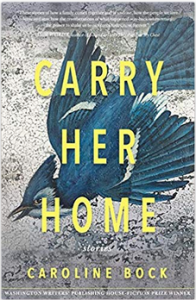 Carry Her Home, Caroline Bock, Washington Writers Publishing House, 2018, 218 pp.
Carry Her Home, Caroline Bock, Washington Writers Publishing House, 2018, 218 pp.
This collection of flash fiction and longer stories, many of which are inter-related, is fully, deliciously unexpected. From the first tiny but densely meaningful story, “The Understanding”, and the second, “O, Tomato,” which reads like prose poetry, it doesn’t take long to catch the rhythm of the stories and a sense of direction, and to realize that what remains unstated carries as much weight as what is on the page.
McEwan’s The Children Act: The Novel or the Movie?
 I’ve never been eager to see movies based on books, mostly because they never live up to the original, but I’m willing to make an exception when Emma Thompson is the star. That’s how I found myself at a showing this week of The Children Act, an almost-excellent film based on the novel of that name by Ian McEwan.
I’ve never been eager to see movies based on books, mostly because they never live up to the original, but I’m willing to make an exception when Emma Thompson is the star. That’s how I found myself at a showing this week of The Children Act, an almost-excellent film based on the novel of that name by Ian McEwan.
The film and the book both come to life in the opening scenes. We meet Fiona, a British High Court judge in the Family Division, wrestling with multiple cases that defy easily solutions, even as she’s confronted with a crisis in her marriage. Her husband of 35 years, frustrated by Fiona’s lack of interest in sex, has just demanded that she let him have an affair with a younger woman.
Book Review: Waiting for Eden
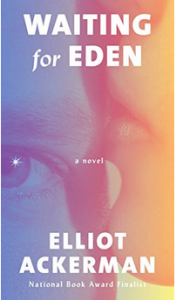 Within the first few sentences of Waiting for Eden, readers realize they are in for something out of the ordinary when the first-person narrator says matter-of-factly, “I was sitting next to Eden and luckier than him when our Humvee hit a pressure plate, killing me and everybody else, him barely surviving.”
Within the first few sentences of Waiting for Eden, readers realize they are in for something out of the ordinary when the first-person narrator says matter-of-factly, “I was sitting next to Eden and luckier than him when our Humvee hit a pressure plate, killing me and everybody else, him barely surviving.”
But out-of-the-ordinary has become the rule for the novels of Elliot Ackerman, author of the critically acclaimed debut Green on Blue, National Book Award finalist Dark at the Crossing, and now his latest, Eden, being released on September 25.
As a journalist, Ackerman was based for a number of years in Istanbul, starting in 2013, where he covered the Syrian Civil War. Among other publications, his writing has appeared in The New Yorker, The Atlantic, The New Republic, and The New York Times Magazine, and his stories have been included in The Best American Short Stories.
Moving Beyond Auto-fiction to the Epic: Three Novel Recommendations
The English publication of the volumes of Karl Ove Knausgard’s My Struggle coincides with a renewed interest in “auto-fiction,” also known as the autobiographical novel. While I have read and enjoyed several of these works of auto-fiction, my favorite is Elena Ferrante’s Neapolitan Novels, which seemed to draw on some auto-fiction elements, but also used other literary devices such as image patterning and developing character arcs, while incorporating motifs of class, politics, art, motherhood, friendship, and feminism.
Since finishing the Neapolitan series I’ve found myself wanting to read more novels that span generations, placing themselves in historical context, in which history itself (just as Ferrante’s working class post-war Italy) becomes a character. Three recent novels fit this bill, and I recommend them to anyone desiring epic historical novels that educate as well as entertain.
It’ll Soon be Time to Enjoy HARD CIDER
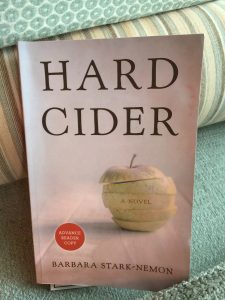 I’ve often written about my admiration of and appreciation for small, independent book publishers, those folks who are in the business much more because of their love of books than their pursuit of the next big blockbuster. Publishing these days has an ever-slimming profit margin amid fierce competition, and that makes things even more challenging for those who do this for love.
I’ve often written about my admiration of and appreciation for small, independent book publishers, those folks who are in the business much more because of their love of books than their pursuit of the next big blockbuster. Publishing these days has an ever-slimming profit margin amid fierce competition, and that makes things even more challenging for those who do this for love.
A small publisher that has drawn positive attention for its business model and a gratifying level of success is She Writes Press. In 2016, books from She Writes Press were awarded seventeen medals at the Independent Publisher Book Awards, the most awards to one press in that year. Under the guiding hand of publisher Brooke Warner, the press has gone from a catalog of eight titles in 2013 to an impressively long list for both spring and fall in this, their six year.
Ali Smith’s Stunning Seasonal Quartet
 Ali Smith—Scottish, 55, fearless—has already made a reputation as one of most ambitious, offbeat, and mesmerizing novelists of our time. Now she’s pushing it a step further with an unusual “seasonal” quartet. The first two volumes, Autumn and Winter, are already out, and you better hurry up and read them because you want to be ready when Spring arrives. And it won’t be long.
Ali Smith—Scottish, 55, fearless—has already made a reputation as one of most ambitious, offbeat, and mesmerizing novelists of our time. Now she’s pushing it a step further with an unusual “seasonal” quartet. The first two volumes, Autumn and Winter, are already out, and you better hurry up and read them because you want to be ready when Spring arrives. And it won’t be long.
The novels are being rushed out, but Smith has her reasons. She wants to put her mark on current events. Most writers of contemporary fiction struggle with an age-old dilemma: Is it better to be timely or timeless? Smith is one of the few with the talent to be both.
Autumn was published in 2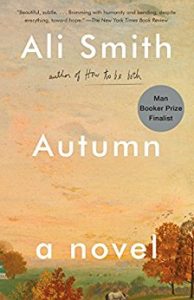 017, barely eleven months after the Brexit vote, and it serves partially as a novel of protest over what Smith clearly believes was a misguided decision by Britain to leave the European Union.
017, barely eleven months after the Brexit vote, and it serves partially as a novel of protest over what Smith clearly believes was a misguided decision by Britain to leave the European Union.
On Launching a Book
Most of us writers want to be published, but more than that, we want validation as a writer. If our book is accepted by an agent and then by a name-brand publisher, we achieve some validation unless the reviewers ring in with a different opinion.
The harsh truth is that agents are confronted by hundreds or thousands of queries a week. They may have a toothache or feel particularly jaded the morning yours arrives, or they might be looking for the latest trendy possibility, a quick sale, a young genius that will have a long life in their stable, or dozens of other reasons that have nothing to do with your book but result in refusal, nonetheless. Agents have been wrong many times—and publishers even more.
Short Story Collection: Don’t Wait to Be Called
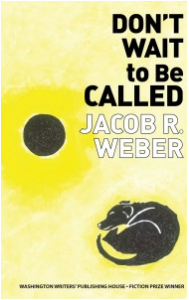 At the Washington Writers Conference coming up in May, I’ll be moderating a panel with four local authors whose debut books made it to publication through very different paths. Each book is also a different genre — memoir/journalism, biography, novel, and short story collection — which means I’m reading four very different books to prepare for the panel.
At the Washington Writers Conference coming up in May, I’ll be moderating a panel with four local authors whose debut books made it to publication through very different paths. Each book is also a different genre — memoir/journalism, biography, novel, and short story collection — which means I’m reading four very different books to prepare for the panel.
The short story collection, Don’t Wait to Be Called, is by Jacob R. Weber. Publication resulted from Weber’s winning the annual fiction prize given by Washington Writers’ Publishing House, a non-profit small press that publishes authors from the Baltimore/Washington area. Weber’s roots, which are on display in his stories, hedge towards the Baltimore end of that geography.
Weber’s biography reads like someone who has lived a few different lives, as a Marine, a translator, and an English tutor to adult immigrants, as well as a waiter and a retail clerk and manager.
Richard Ford’s Bascombe, A Jersey Guy
 As a transplanted but still loyal New Jerseyite, I was skeptical when a friend recommended Richard Ford’s book Let Me Be Frank with You as a humorous take on Hurricane Sandy. I couldn’t imagine anything funny about the storm that leveled large swaths of my former state, but I was curious to see how anyone could. While I differ with her characterization of this as a humorous take, I wholeheartedly agree with her recommendation of this book.
As a transplanted but still loyal New Jerseyite, I was skeptical when a friend recommended Richard Ford’s book Let Me Be Frank with You as a humorous take on Hurricane Sandy. I couldn’t imagine anything funny about the storm that leveled large swaths of my former state, but I was curious to see how anyone could. While I differ with her characterization of this as a humorous take, I wholeheartedly agree with her recommendation of this book.
Let Me Be Frank with You is humorous the way Chaplin’s Little Tramp was humorous, the way Larry David’s “Curb Your Enthusiasm” is humorous, and the way life is humorous. There’s artistry in blending the bitter and the sweet, and Ford is a master at it.
Looking for Improvement? Discover Joan Silber
 For too long, Joan Silber has labored in the shadows, her work overlooked, underappreciated and read by too few. I’m here to correct that. Or at least give it my best shot.
For too long, Joan Silber has labored in the shadows, her work overlooked, underappreciated and read by too few. I’m here to correct that. Or at least give it my best shot.
I just completed her latest novel, Improvement, and it is a stunning work, full of subtlety and insight, conveying an understanding of how ordinary people struggle to make something of their lives. Politicians who want to connect with “real” Americans would have a better chance of doing so if they studied Silber’s work, beginning with Improvement.
Reviews often describe this novel as one of linked short stories, but I don’t think that’s fair. While most of the chapters can stand on their own (and some were published that way), they are more linear and more intertwined than the linked-story novels you may be used to (think Elizabeth Strout’s Anything Is Possible or Olive Kitteridge).
Florida Mysteries a Respite from Winter
As I write this, snow is predicted for tonight. Temperatures have been in the teens and below but hovering during the day in the 20s. I walk my dog outside in this weather. I’m ready for Florida.
I once lived on a boat, sailed into Fort Lauderdale and stayed there for 15 years. I didn’t live at the Bahia Mar Marina like John D. MacDonald’s Travis McGee, but rather up the north fork of Fort Lauderdale’s New River. That’s when I began a love affair with books, especially mysteries, set in Florida.
What is more raucous and hilarious than a mystery by Carl Hiaasen. His characters, like the roadkill-eating ex-governor, are weird, but no weirder than many of the people I actually met in South Florida.
In Praise of President James Garfield and His Biographer
 A good novel can keep readers turning the pages as they try to guess what will happen. Nonfiction writers have the challenge of keeping readers interested even if they know what will happen. Candice Millard succeeds beautifully in Destiny of the Republic: A Tale of Madness, Medicine and the Murder of a President, a page-turner about a president most Americans never think of, James A. Garfield. With her skillful storytelling, she brings the long-forgotten president to life and shows him to be a man of courage, brilliance, modesty, integrity, and goodness.
A good novel can keep readers turning the pages as they try to guess what will happen. Nonfiction writers have the challenge of keeping readers interested even if they know what will happen. Candice Millard succeeds beautifully in Destiny of the Republic: A Tale of Madness, Medicine and the Murder of a President, a page-turner about a president most Americans never think of, James A. Garfield. With her skillful storytelling, she brings the long-forgotten president to life and shows him to be a man of courage, brilliance, modesty, integrity, and goodness.
Garfield, the twentieth U.S. president, was shot just four months after his inauguration and died eleven weeks later. His short tenure robbed him of any chance at achievements and renown.
Richard Russo’s Take on Academia
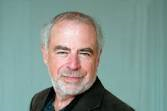 I don’t normally use this space to review twenty-year-old books, but for Richard Russo, I’ll make an exception. Regular readers know I’m a huge Russo fan. He’s been a big influence on my own writing, and I thought I’d read everything he wrote. But last month a friend recommended one of his novels that I’d missed: Straight Man, published in 1997. It’s the funniest serious novel I’ve ever read.
I don’t normally use this space to review twenty-year-old books, but for Richard Russo, I’ll make an exception. Regular readers know I’m a huge Russo fan. He’s been a big influence on my own writing, and I thought I’d read everything he wrote. But last month a friend recommended one of his novels that I’d missed: Straight Man, published in 1997. It’s the funniest serious novel I’ve ever read.
The narrator, William Henry Devereaux Jr., is heir to a famous name and not much else. He’s a writing professor and temporary chair of the English Department at a third-rank state college in a small fictional town in Pennsylvania. Hank’s father, who looms large throughout the book, was a hugely successful academic and literary critic and a hugely unsuccessful human being.
A Fourth Look at a Great Book: The Virginian by Owen Wister
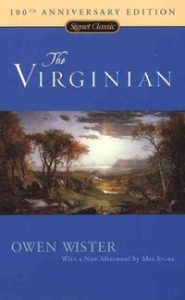 Some people seek comfort food, but I tend toward comfort books. Comfort books are the ones I return to when the problems of the day become too much. They’re my macaroni and cheese without the calories.
Some people seek comfort food, but I tend toward comfort books. Comfort books are the ones I return to when the problems of the day become too much. They’re my macaroni and cheese without the calories.
A few weeks ago, as Americans seemed at war with Americans, I turned to one of my comfort books, The Virginian: A Horseman of the Plains by Owen Wister. This 1902 novel was required reading when I was in junior high school. I loved it then and loved it again when I reread it in 1980, 1991, and late this summer. The book belongs near the top of any list of great American novels.
I feel almost apologetic for enjoying the book. There’s much in it to make 21st-century Americans shudder, including racial epithets, vigilante justice, and sexism.
KNOW THE MOTHER Shows What Flash Fiction Can Do
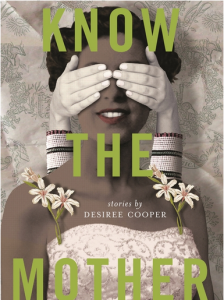 Though she loves to read novels, author Desiree Cooper found that her fiction comes from her in a much shorter form. “If there was no such thing as flash fiction, I would have had to invent it,” says the 2016 debut author of the collection of flash fiction titled Know the Mother. If you’re not terribly familiar with flash fiction, which works to tell an evocative story in a very compressed space, this lovely, haunting collection demonstrates just how effective and affecting this genre can be.
Though she loves to read novels, author Desiree Cooper found that her fiction comes from her in a much shorter form. “If there was no such thing as flash fiction, I would have had to invent it,” says the 2016 debut author of the collection of flash fiction titled Know the Mother. If you’re not terribly familiar with flash fiction, which works to tell an evocative story in a very compressed space, this lovely, haunting collection demonstrates just how effective and affecting this genre can be.
Mother’s stories have a strong common thread of dreams delayed or abandoned — suppressed under the weight of obligation — and of how identity is tied to those dreams. Who are we, really, if we’re never allowed to be who we want to be?
A Reader’s Reader
“I have always imagined that Paradise will be a kind of library.”
—Jorge Luis Borges
I had the distinct pleasure recently of being on a panel at the Washington Writers Conference with Tom Shroder—author, ghostwriter, journalist, and long-time editor of the Washington Post Magazine—and Michael Dirda, even longer-time book critic at the Washington Post and elsewhere. We were discussing the fuzzy lines that separate memoir, family history, and fiction.
As part of preparing for the panel, I read two of Michael’s several books: his most recent, Browsings, and his memoir of the first third of his life through college, An Open Book.
Let the Book Speak for Itself
A Review of Hillbilly Elegy
In my last posting, I discussed three books of non-fiction that touched on topics of empathy, compassion, and a shared social contract, and that together, I felt, made some illustrative commentary on the events of that day, January 20th, 2017. One book that I had hoped to include—but which landed on my reading stack a bit too late to make the cut—was another unexpectedly successful work of non-fiction. It, too, highlights some of the themes of my earlier discussion.
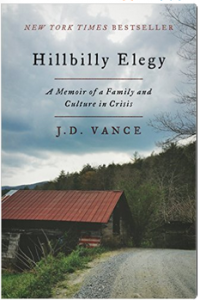 Hillbilly Elegy: A Memoir of a Family and Culture in Crisis is a memoir by a young Yale-educated lawyer named J.D. Vance. He beats his readers to the punch in offering his own wry objection to a 31-year-old’s writing a memoir, but he has much to offer us as he relates his own experience in what is arguably the most forgotten and dismissed segment of the American population.
Hillbilly Elegy: A Memoir of a Family and Culture in Crisis is a memoir by a young Yale-educated lawyer named J.D. Vance. He beats his readers to the punch in offering his own wry objection to a 31-year-old’s writing a memoir, but he has much to offer us as he relates his own experience in what is arguably the most forgotten and dismissed segment of the American population.
Nobel Prize Winner Patrick Modiano’s Dora Bruder
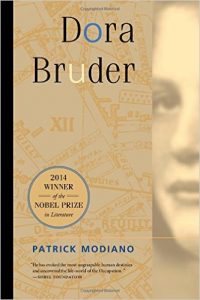 Last year when the Nobel Prize in Literature went to Bob Dylan, many people responded with the question, Why? Two years earlier when the Nobel Prize committee named Patrick Modiano the recipient of its literature prize, another question was often asked, Who?
Last year when the Nobel Prize in Literature went to Bob Dylan, many people responded with the question, Why? Two years earlier when the Nobel Prize committee named Patrick Modiano the recipient of its literature prize, another question was often asked, Who?
Though Modiano had published about thirty works in his native France, he was almost unknown in this country. Only a dozen of his novels had been translated into English, and the publishing house David R. Godine, which had published three of them, sold only about 8,000 copies.
The Nobel Prize changed that, and we readers are the beneficiaries.
Toward Compassion
Words matter. It would be surprising if I as a writer didn’t believe that to be true, since words are my entire stock in trade. Words have meaning. A shared understanding of the meaning of words is what allows us to communicate and function as a society. Words have shades of meaning, too—nuance—and understanding that nuance allows us all to send and receive exactly the message that’s intended.
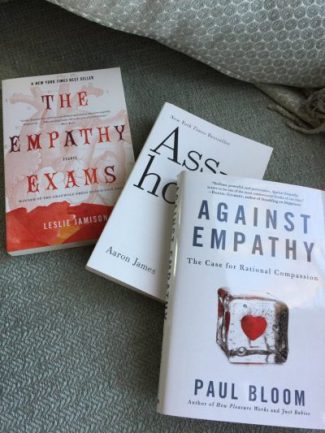 There are roughly 130,000 words in the English language. It’s said that Shakespeare had a working vocabulary of 54,000 words, which was not out of the ordinary for an educated man of his time. In comparison, modern Americans have a working vocabulary of about 3,000 words. As we continue to pare back our words, nuance is lost.
There are roughly 130,000 words in the English language. It’s said that Shakespeare had a working vocabulary of 54,000 words, which was not out of the ordinary for an educated man of his time. In comparison, modern Americans have a working vocabulary of about 3,000 words. As we continue to pare back our words, nuance is lost.